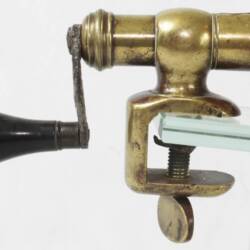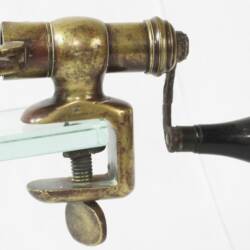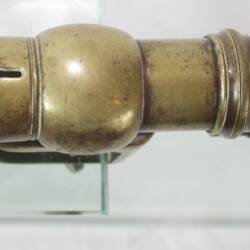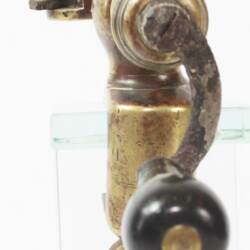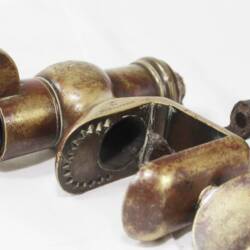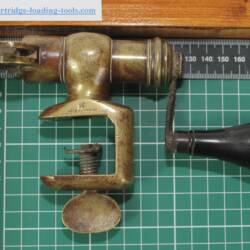Description
Item number : UK HAW BC A
Origin : United Kingdom
Style : English Style
Gauge : 12
Suitable for pinfire : Yes
Stabilizer : No
Cartridge pusher : No
Maker : G. & J.W. HAWKSLEY Ltd, Carver Street, Sheffield
Markings : “G. & J.W. HAWKSLEY’S .” and “12” on body
Biggest length : 190 mm but a substantial part fails
Weight : 572 grams
Length of shell tube : 70 mm
Suspension of press lever : Single
Press handle : Steel. Completely rusted. Fails partly
Turning handle : Steel . turning lever with ebony handle in very bad shape.
Closing cup : Brass
Materials body : Brass
Paint : N.a.
Table clamp : Table clamp is part of the body. Is U-shaped. In the lower part of this “U” there is the screw.
Screw top is triangular with sharp pins at the edges, like A-1
Condition : Bad, because the steel parts are very rusted or failing.
Repairs : None.
Remarks : .
The only written information available is from the (Cornell Publications) reprint of the Hawksley catalogue from 1889. This catalogue is not complete. There are tools that are not mentioned in this catalogue.
Unlike Dixon, Hawksley does not list the catalogue numbers on the tools themselves. It is therefore often a matter of guessing what the catalogue number of a tool is. I have done my very best to achieve some ranking.
Most of the Hawksley bench rest closers – apart from the A50 and (A)A44 models – have numbers with an (A)A70 in the number. Actually, the only exception is the A31C. That the tool with the Dixon no.5 press lever.
The best quality Hawksley tools have horn handles. The 2nd and 3rd quality tools have ebony handles. Quite often it is very difficult to tell the difference between ebony and horn. The kind of horn (buffalo?) Hawksley used is very dark; black. Just as ebony. If you have both materials in a pure form you can heat them and smell the difference. The handles of loading tools however are always a bit greasy. That means that you always get the same scent.
In the catalogue this tool is not listed. I think this tool is older than the catalogue.

